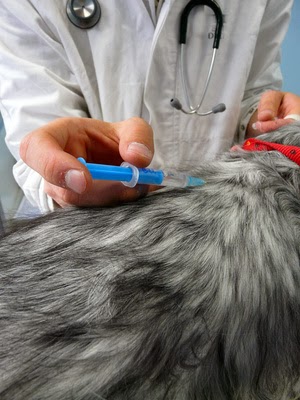
If you are the owner of a new cockapoo puppy, or even rescued an adult cockapoo, you most likely are thinking about the important vaccinations that you will be prompted to get by your veterinarian. There are several vaccines for dogs available, some are more important than others, depending on local laws and the area that you live with your cockapoo.
There are four core vaccines that are given in dogs. These are distemper, rabies, canine parvovirus, and canine hepatitis. The majority of the core shots should be given between 7 and 8 weeks, or even as young as 6 weeks, if suggested by your vet. Although new pet owners may have apprehension about vaccinating their cockapoo, these shots are very important for your puppy’s health.
Young dogs are very susceptible to disease, and if you are the proud owner of a new adopted cockapoo, you may also want to have a checkup and blood work done, which can sometimes tell you of past vaccinations. If you are unsure, your veterinarian may suggest a booster for the most important vaccines. The secondary vaccines that are available are bordetella, giardia, bronchiseptica, lyme disease, coronavirus and leptospirosis. Your vet would assess whether these are needed and help you make an informed decision regarding them.
Once you have gotten the vaccines necessary for your cockapoo, you will want to watch for side effects. Your pet’s veterinarian may tell you, or actually give you, a list of side effects, but just in case, we want to let all you cockapoo owners know some of them here. There are some fairly common side effects, and some that are out of the ordinary.
Common side effects can include: sleepiness, little to no appetite, grumpiness, shaking, and even a fever. Sometimes there will be a hard lump at the site of the injection. It may not cause your dog any pain, or it could be painful or sensitive to touch. This is fairly common and should go down within a few days. Let your vet know about it, and if it doesn’t go down after two or more weeks, you may want to see the vet again to be sure there is no issue. There may also be discharge from your cockapoos eyes or nose and they may sneeze. These are all common and unlikely to mean there is anything wrong.
Often, most pets will experience tiredness or lethargy within the first 24 hours of vaccinating. You may see mild to severe shaking, likely due to fever. You can hold them in your lap or put your cockapoo in a warm bed, wrapped up so she can rest, and she should feel better within 24 to 48 hours. You will want to keep your vet updated of any changes, of course. Especially the ones below, which are less common.
Less common side effects can include: facial swelling or hives, diarrhea, collapsing, seizures, vomiting, difficulty breathing or anaphylaxis. These are symptoms of an allergic reaction to the vaccine and you will want to call your cockapoo’s veterinarian immediately. They can assess the severity and what needs to be done, either over the phone or in their office. If you know mild allergic reactions are common on your cockapoo, you can give a small dose of Benadryl (diphenhydramine) from the doggy first aid kit you have built, with vet approval, before you bring them in for vaccines or boosters.
The most important thing with any health care with your dog is keep an eye out for eating, behavior, and potty changes. These are the things that will be the most noticeable to you and you can talk to your vet about anything you might feel is wrong.
Although many side effects are quite common and will go away on their own, we recommend that you always err on the side of caution! A phone call is free, keeps your veterinarian in the loop, and can bring you peace of mind.
